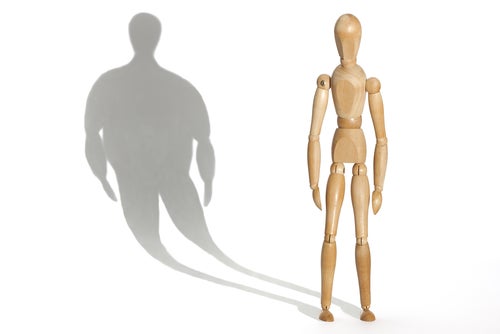It's Time to Squash Those Unhealthy Body Image Thoughts

In this excerpt from The Brave Athlete, Dr. Simon Marshall and Lesley Paterson explain how your body confidence can impact your performance and enjoyment of the sport.
Feeling Fat: Why Self-Talk Matters
Feeling unhappy about the way you look is something almost all of us have experienced at some point in our lives. Whether it’s your sticky-out ears, the size of your forehead, your skin or your thighs, there’s not a single body part that hasn’t caused untold anxiety to someone, somewhere.
However, when it comes to sport, the common culprits behind body dissatisfaction are fat and muscle. Too little or too much of either can wreak havoc with your Chimp and Professor brains. For endurance athletes, problems with body image are impossible to ignore because you routinely squeeze yourself into Lycra and prance about in public. While parts of your body might feel like taut guitar strings, other parts can feel more like a lava lamp where blobs drift around trying to find a home.
RELATED: Why You Should Have a Triathlon Alter Ego
When athletes have an “I feel fat” moment, it manifests as cognition, or thought.
Cognitions or thoughts are simply things you say to yourself in your head. All cognition is self-talk because thoughts appear in our head as words or sentences. Here are some examples of the thoughts that athletes tell us they have during a fat moment:
I feel like a McChunk-Chunk today.
I just feel so bloated.
Urgh, I’m bulging out of my clothes. F*ck, why did I eat that last night?
I feel like a sausage in my kit today.
When I bend over, I can feel rolls.
I can’t look at my legs in the mirror. I just see cellulite.
Flab. I just feel and see flab.
We experience “feeling fat” through self-talk.
If we want to get even more scientific about it, there’s no such thing as feeling fat. This is not just about semantics but actual neurological differences between a thought and a feeling and an emotion. For our purposes, we use the terms “emotion” and “feeling” interchangeably even though it’s not technically accurate to do this.
Emotions precede feelings, neurologically speaking. Emotions originate in the limbic system (Chimp brain) and cause physical changes in your body, whereas feelings add a layer of interpretation from your frontal cortex (your Professor brain)—a sort of mental representation of what’s going on. These mental representations appear as thoughts or self-talk. For example, being scared is an emotion that may give rise to feelings of being fearful or nervous, which, in turn, may give rise to the following self-talk: “You need to back away from the dog very slowly”—a thought. Ok, back to feeling fat.
When you feel fat, you’re actually feeling something else.
Feeling fat is a smokescreen for other feelings. For example, you might feel frustrated that you don’t feel in control of your exercise or eating habits, or depressed that with all the exercise you do, your body still doesn’t look the way you want it to. Perhaps you feel jealous or envious of the badass athlete with the great legs, or you’re worried about gaining weight.
Before we start digging into what your “something else” feelings are, we need to uncover what triggers the “I feel fat” in the first place. Then we need to deconstruct why we have the underlying feelings.
[velopress cta=”See more!” align=”center” title=”More from the Book”]